Gas boilers have been familiar in many households, providing warmth and hot water for years. However, their reliance on fossil fuels and contribution to carbon emissions have raised concerns about their environmental impact. It’s time to explore greener alternatives that reduce your carbon footprint and offer long-term cost savings.
This article will introduce five eco-friendly heating solutions to help you future-proof your home. We’ll break down their benefits and drawbacks, from heat pumps and electric radiators to biomass boilers, infrared heating panels, and solar thermal panels, to help you make an informed decision. With the British government’s commitment to limiting new gas boiler installations by 2035, exploring these alternatives is crucial in finding the perfect fit for your household. Let’s journey towards a more sustainable and cost-effective heating future.
Contents
- 1 Key Takeaways
- 2 How Do Gas Boilers Operate?
- 3 The Best Green Alternatives to Gas Boilers
- 4 When Will Gas Boilers Become Obsolete?
- 5 What Are the Challenges of Making a Switch From Gas Boilers?
- 6 Heat Pump Source: Reliable Heating and Cooling Solutions
- 7 In Conclusion
Key Takeaways
- Gas boilers are being phased out due to their environmental impact, making it essential to explore green heating alternatives.
- This article introduces five eco-friendly options, including heat pumps, electric radiators, biomass boilers, infrared heating panels, and solar thermal panels, highlighting their benefits and drawbacks.
- With government incentives and a commitment to reducing carbon emissions, now is the time to transition to a sustainable and cost-effective heating solution that suits your household’s needs.
How Do Gas Boilers Operate?
Traditional gas boilers run on natural gas or liquid fossil fuel to heat up water. Hot water then runs through a network of pipes to reach your radiators and water taps.
Radiators have metal fins that take up the heat and emit it to the surrounding air by transduction. This way, you’re getting cosy warm air to help you get through the coldest winter nights.
For this process to take effect, the gas boiler needs to continuously burn fossil fuel provided by underground pipes or swappable cylinders.
The combustion process is the source of carbon emissions, so imagine the impact on the environment when we need to keep our boilers running non-stop during the winter season!
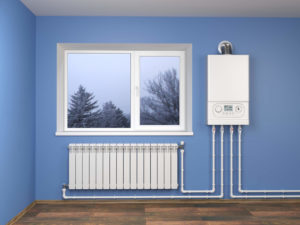
The Best Green Alternatives to Gas Boilers
Let’s set you on the right track to future-proof your house and secure an affordable, eco-friendly energy source for the years to come. We’ve compiled a list of the best green alternatives and highlighted the potential gains you’ll achieve by opting for carbon-neutral products!
1. Heat Pumps
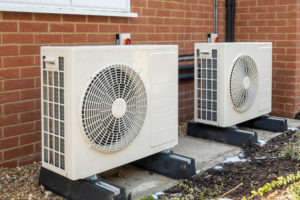
Consider heat pumps as ingenious devices that function somewhat like a refrigerator in reverse. They harness heat energy from the environment—the air or the ground—and transfer it inside to warm your space during winter. Conversely, they can reverse the process to cool your interior in summer.
There are two main types: ground-source heat pumps that extract heat from the ground and air-source heat pumps that work efficiently even in colder outdoor temperatures. These systems efficiently upgrade the collected heat to a higher temperature and then distribute it throughout your home, providing a comfortable environment year-round.
One of the most compelling benefits of heat pumps is their efficiency. Compared to traditional electric heaters, heat pumps can deliver up to four times more heat for each unit of electricity they consume. This efficiency translates into significant savings on electricity bills over time, making heat pumps an attractive investment for cost-conscious homeowners.
While the upfront cost of installing a heat pump may seem daunting, the UK Government’s Boiler Upgrade Scheme (BUS) provides financial support to alleviate this burden. The scheme offers grants of £7,500 for air source heat pumps and £6,000 for ground source heat pumps, making renewable heating technologies more accessible. This initiative helps homeowners manage installation costs and supports the transition to sustainable energy sources, reducing the carbon footprint of heating homes.
By taking advantage of the Boiler Upgrade Scheme, homeowners can invest in a heat pump system that leverages sustainable energy, aligns with environmental goals, and contributes to a greener future.
Benefits
- Safer operation as they don’t operate on local combustion
- Outstanding efficiency with a Coefficient of Performance (CoP) scoring 3.5+ out of 4
- Eligible for British government subsidies
- Low maintenance costs
- Some are capable of cooling your house
- Don’t take up internal space
- Work seamlessly with solar panels
Drawbacks
- High upfront installation cost
- Might not be compatible with the radiators you already own
- You need planning permission from your local council to install a heat pump
- Questionable reliability in cold areas with temperatures below 15 degrees
- Require excellent home insulation for optimal performance
Bottom Line
Heat pumps are perfect for houses with lots of outdoor space. They play nicely with solar panels, making them ideal for homeowners who’ve already invested in solar roofs. Nevertheless, you should steer clear if you’re living in an extremely cold neighbourhood with below-zero temperatures as you have much better options to choose from.
2. Electric Radiators
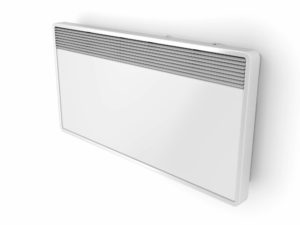
Heating technology has come a long way over the years, making it possible to pack all the components needed for a heating circuit in a compact form factor that can seamlessly blend with your internal decor.
Such radiators run on electricity, but they deploy some tricks to be as power-saving as possible. You get advanced controls to ensure you’re always hitting the desired temperature. Also, you can set multiple timers to make every minute count and avoid unwanted power consumption.
It’s also worth noting that electric radiators are easy to install, and you can embark on such a DIY journey without needing to pay for a professional. You can get your electric radiator treatment as a free-standing shell or you can opt for a wall-mounted model, depending on how much space you have at your disposal.
Unlike their antique gas counterparts, electric radiators are silent. Random crackles and pops should be a thing of the past. To make your electric radiator transition as green as possible, you can invest in solar panels or sign up for clean energy initiatives that generate electricity from renewable sources instead of burning fossil fuel.
Benefits
- Come in different styles to suit your internal aesthetics
- Straightforward installation process
- Suitable for small flats with no outside space
- Compact form factor
- Offer advanced controls for temperature regulation
Drawbacks
- If your electricity source uses fossil fuel, you’re still emitting carbon into the atmosphere
- The savings to your electricity bills aren’t as tangible
Bottom Line
Electric radiators are the way to go if you have limited internal space at your disposal and don’t have the luxury of a backyard. You’ll have to pay extra attention to your electricity source, though, to ensure you’re operating on renewable energy.
3. Biomass Boilers
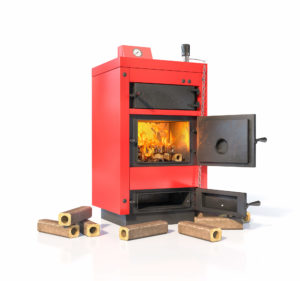
Gas and fossil fuels take up millions of years and a combination of extreme conditions to form. What if we use other biogenic materials that are readily available and don’t leave as much of a toll on our planet? That’s exactly the question that led to the development of biomass boilers.
Such boilers have tightly sealed combustion chambers where wood byproducts in the form of pellets, chips, and logs are burnt. Only a small amount of carbon particles make it to the atmosphere, and then they’re taken up by other plants to go into photosynthesis.
So the end result is a carbon-neutral combustion that doesn’t mess up with the delicate equilibrium of our atmosphere. That’s not all; biomass boilers are also extremely efficient. For example, wood pellets are highly calorific, giving up to ten times as much energy compared to the same amount of gas.
In terms of operation cost, wood pellets and chips come at a comparable cost to that of fossil fuel. However, with lots of uncertainty surrounding gas availability and the extreme fluctuations in prices, biomass fuel proves to be the more reliable option for years to come.
Besides, if you live in an area with readily available wood waste, you can basically run your biomass boiler all winter long without spending a single pound.
Benefits
- Biomass fuel is efficient and more affordable in the long term
- Eligible for the Boiler Upgrade Scheme
- Carbon-neutral operation
- An excellent way to recycle wood waste lying in your backyard
Drawbacks
- Eat up a lot of space as they can be four times as big as their gas counterparts
- Require special flue installation
- Maintenance could be a hassle; especially if you get a manual model that requires refuelling by hand
Bottom Line
If you’re based in a remote location with lots of wood waste in the vicinity, biomass boilers should be on your radar. You might have to sign up for some renovations to make up space for the boiler and install its proprietary flue system.
4. Infrared Heating Panels

Don’t let the look of infrared heating panels deceive you. For the most part, they look like any other radiator, but under the hood, they operate in a completely different way. Instead of depending on convection to warm up the air, such heating panels emit infrared energy.
Infrared isn’t capable of heating our surrounding air, as the molecules are widely spaced. Instead, infrared energy is absorbed by solid objects and ends up making the particles go into vibration. Such a process is the catalyst that gives out heat!
So, when setting up infrared heating panels, make sure they’re sitting at a spot facing where people usually hang out in the room. Another point to bear in mind is that such heating technology can’t be used to heat up water. You’ll have to install a separate system to secure your hot water requirements during winter.
In terms of energy consumption, infrared panels operate at a lower wattage. This should be good news for all the cost-effective house owners out there as they would make noticeable cuts to their monthly utility bills by adopting infrared heating.
Benefits
- Unlike heat pumps and biomass boilers, infrared heating panels take up little space
- Silent operation
- Excellent choice if any of your family members suffers from an allergy, as heating doesn’t involve air circulation
- Capable of fast heat emission
- Straightforward installation process
- When it comes to energy usage, infrared panels are efficient
Drawbacks
- Suboptimal performance when objects are between the panels and the people in the room
- Can’t be placed facing a window, as infrared energy can pass through glass
- The moment you turn off your infrared heater, the room feels cold
Bottom Line
If you don’t want to rework your home insulation, infrared heating panels should be a nice fit for your house. They cover up large areas provided they have a clear line of sight to people in the vicinity. You might need to move your furniture around to ensure your infrared panels operate optimally.
5. Solar Thermal Panels
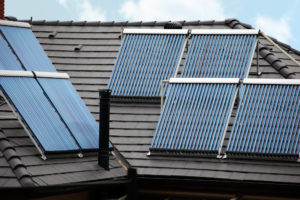
What better way to wrap up our list than with solar thermal panels? Such a heating solution takes the strain off your existing boilers and provides up to 70% of your hot water needs.
This translates into remarkable savings on your energy bills as the free solar energy is making a sizable contribution to your home’s heating requirements.
The system requires fitting solar collectors onto your roof to absorb energy from the sun and pass it through a special fluid that, in turn, heats up the water inside your house. Sure, you’ll have to commit to costly upfront installation fees, but the return on investment is totally worth it.
Even those who are still on the fence when it comes to the reliability of renewable energy can hop on board the solar thermal panels’ train without a second thought.
This is because your house technically has a backup heating system that kicks into action whenever the solar panels can’t meet up with your energy needs. You’ll have a smoother transition and build up confidence in eco-friendly energy solutions based on firsthand experience!
Benefits
- Few maintenance requirements
- Low running costs
- Provide up to 70% of the hot water needs for the average British household
- Carbon emissions are kept at a minimum
Drawbacks
- Initial installation costs are on the pricey side
- The amount of heat produced depends on sky clarity and local weather conditions
- Can’t be used as the only source of heating for your house
- Time-consuming and difficult installation process
Bottom Line
If you’re already investing in solar panels for your roof, you can slip thermal solar collectors into the mix to cover up to 70% of your heating requirements. Solar thermal panels are perfect as a secondary heating system to take some toll off your existing boilers.
When Will Gas Boilers Become Obsolete?
The British government is committed to its Heating and Building Strategy that aims to limit new gas boilers installation by the year 2035. Legally speaking, there are no binding laws in place for the foreseeable future, but at least we have a clear idea about what the new policies are shooting for.
It only makes sense that we need to get ahead of things and start making the carbon-neutral transition without having a deadline rushing us into making poorly planned decisions!
What Are the Challenges of Making a Switch From Gas Boilers?
Green alternatives to gas boilers aren’t similarly effective for all households. For instance, you can’t opt for solar panels if you have a flat roof. Also, heat pump installation won’t be possible if you don’t have access to a large backyard.
The good news is you have tons of carbon-neutral options to choose from. Do your homework and ensure your green solution of choice makes a seamless fit into your house!
Heat Pump Source: Reliable Heating and Cooling Solutions
At Heat Pump Source, we take pride in our unwavering commitment to serving the UK with top-tier HVAC solutions. From the efficiency of heat pumps and the cool relief of air conditioning to the warmth of boilers, radiators, and underfloor heating, our dedicated team is always at the forefront of innovation. We understand the unique needs of every household and business, and we strive to provide dependable health and cooling products and services that are tailored just for you. Ensuring your comfort and satisfaction is our utmost priority. Whether you have questions, need guidance, or require support, we’re always here to assist. Please don’t hesitate to contact us; we’re eager to be of service.
In Conclusion
With ongoing advancements in renewable technologies, an increasing number of UK households are now more willing to adopt eco-friendly energy solutions. This shift towards green alternatives is significantly supported by government initiatives to make the transition more financially viable for consumers.
Replacing the Renewable Heat Incentive (RHI), the UK government now offers the Boiler Upgrade Scheme (BUS) to alleviate some of the initial financial outlay associated with installing carbon-neutral heating systems. This scheme is a testament to the government’s commitment to encouraging the adoption of renewable energy solutions by making them more accessible and affordable.
By understanding the options available and leveraging the support provided through the Boiler Upgrade Scheme, you can decide on the best green alternatives to traditional gas boilers for your home. Whether you opt for air source heat pumps, ground source heat pumps, or biomass boilers, these technologies not only reduce your carbon footprint but can also lead to long-term savings on energy costs.
We hope this information helps guide your journey towards a greener, more sustainable energy solution for your home, making your transition to renewable energy as seamless as possible.
About the Author
At Heat Pump Source, our articles are the product of a collaborative effort among a team of highly skilled HVAC experts. Our dedicated professionals, hailing from diverse backgrounds in heating, ventilation, air conditioning, and refrigeration, contribute their extensive knowledge and experience to every piece of content. This multidisciplinary approach ensures comprehensive coverage. Our commitment is to deliver authoritative, reliable, and tailored advice to meet the unique needs of every household and business across the UK.

